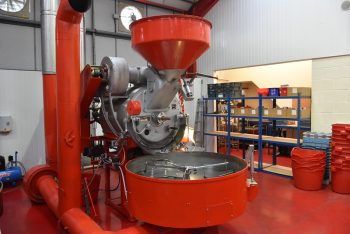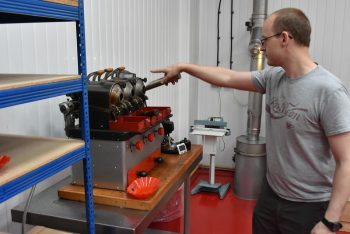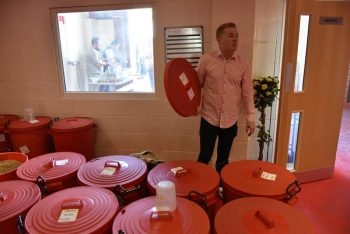I have been buying coffee beans from Has Bean for several years. Their unique selling point is they ship the beans on the same day they are roasted, so they are really fresh. They also cater to coffee geeks by letting us choose beans by country of origin, plant variety and processing method. And they do not roast the beans too much so it is possible to taste the difference all these things make.
On Sunday they had an open day at their facilities near Stafford. They simply opened the doors and did coffee cupping (i.e. tasting), brewing demonstrations, talks and tours. They threw in some real ale and nibbles for good measure. I went along.
The story goes that the boss, Steve Leighton, got fed up with his job as a prison guard and decided to turn his coffee roasting hobby into a business. After trying to sell coffee on Stafford market, he became exasperated when a customer came back to complain that the ground coffee would not dissolve in the water. It was after this that a friend suggested he tried selling coffee on the Internet.
The chief roaster, Roland Glew, after explaining exactly how the roasting is done by smell and sound of cracking, and how roasting for ten seconds too long can ruin the product, told us how speciality coffee buyers interact with farmers. Steve Leighton visits farms, gets invited into the farmers’ family homes and treated like family. Whereas once upon a time their coffee would be thrown into a bag labelled “coffee” and they would get a fixed price, Leighton can work with them to explain what people want, get them to change their methods, try new varieties of plant or different processing methods, divide up the farms differently, and generally get them to make better coffee because he is able to pay a premium for it. He is able to make assurances about how much coffee he will buy so they can safely make the needed investments, and continue to buy coffee if a farmer has a bad year because it is in his interests to keep the farm in business. Has Bean are even experimenting with what would otherwise be waste: cascara and coffee flowers.
This is what innovation leading to economic growth looks like. It is largely made possible by the dis-intermediation of the Internet. Geeks are all but buying coffee directly from farmers. The Internet also has a way of bringing people with weird hobbies, like getting all serious about coffee, together. An individual becomes part of a global buying market who otherwise might have been the only weirdo in town.
It is a completely different way of making poor people richer than Fair Trade, which a Department for International Development report found does not even work. Steve Leighton is not very impressed with Fair Trade, either.
I asked Steve how much import tariffs affect his business. He said not a lot. Thinking about it, this makes sense. Possibly one reason coffee prices are in general so low is that other things farmers could grow are hit by trade barriers. Only coffee is left. He was much more worried about the exchange rate movements since the Brexit vote.
Steve seems particularly fond of Bolivia. On the visit I heard a lot about how life is hard for Bolivian coffee farmers because the president Evo Morales is more interested in supporting coca farmers. He also told a great story about the Yungas Road, which he travels on. It was the most dangerous road in the world because vehicles would fall off of it. Then a bypass was built, but travelling on the bypass was expensive because bribes would need to be paid at checkpoints. So now Steve uses a company who run bicycle tours for tourists to get down the road.
More pictures from me, here. See and hear more from Steve in his fascinating “In My Mug” videos, like this latest one from Bolivia. You can hear more about his most recent trip to Bolivia in this Tamper Tantrum podcast.







Being an aeropress nerd, I may try some of this. Any recommendations, I normally like the richer South American beans.
RB: It’s hard to go wrong, really. My staple coffee I always have at home is the Blake blend. I suppose a blend is more likely to be rich tasting. https://www.hasbean.co.uk/collections/has-bean-blends/products/blake-espresso-blend-mk5-2016
My personal favourite from the day was this one, which had a savoury, almost spicy flavour. But annoyingly I can’t find it for sale on the site! https://robfisher.smugmug.com/Events/Hasbean-open-day-August-2016/n-LMj5mC/i-ZnJVRWB/A
From your description I’d be tempted to try this natural Bourbon from El Salvador (I also tasted this one on the day and I think the natural processing tastes “rich”): https://www.hasbean.co.uk/collections/america-el-salvador/products/el-salvador-finca-argentina-natural-bourbon
I must say that does look like a great operation!
The Llamaserie gets its coffee from an outfit called Java Roasters in Wixom, MI. They are the manufacturer of the air-blast coffee-roasting machine that you may have seen in fancy food stores like Whole Foods and so forth.
Their deal is that they will roast your specific beans for you, to your specific instructions, while you wait, then grind them to spec. They have a row of their coffee roasters sitting there, all programmable to roast it however you like it. You walk in, tell them how many pounds of what green beans you’d like, then they roast them for you while you wait, a pound or two at a time. It takes about 10 minutes. Then, if you like, they’ll grind the roasted beans any way you want them.
Don’t get no fresher nor that, and 100% custom as well. As an added advantage, the roasted beans are far cleaner than any I’ve seen by any other process – the air-blast process means that they do not get beaten and battered as in a conventional roaster, and all fines and loose material are blown away during the roasting process.
Oh, God, I’ve become a coffee bore :-).
llater,
llamas
Good post.
Isn’t this yet ANOTHER reason why Britain should leave the EU?
Modern communications and transport technology mean just about any business, no matter how small, can become an international business, should it so desire.
He doesn’t suffer too badly from import tariffs because he’s importing green coffee. EU tariffs on raw agricultural produce, especially from the less-developed areas of the world, are quite low. If, on the other hand, his Bolivian coffee farmers did what he did and set up a small roasting plant and he imported the roasted beans or the ground coffee, then that’s when the tariffs start to bite.
Same thing in other areas; low (relative) tariffs on imported iron ore, much larger ones on rolled steel.
Why is that – because the tariffs target labor rather than materials?
@Alisa
They target added value. The EU’s “own resources” – the amount of the budget that is by treaty indisputably theirs, comes as a proportion of VAT levies in the member states. It’s in the EU’s interests that those value-adding activities (like roasting coffee, grinding roast coffee, smelting ore, or rolling steel) happen within its boundaries. Inside the EU, VAT is levied and the EU gets its cut; at every step of the value-add chain. Every one of those activities that happens outside deprives the EU of its
vigrightful due. Can’t have that, now, can we?Crony capitalism is also involved. The Common Agricultural Policy originally raised tariff walls to protect small, inefficient farms’ raw produce*. They then ran into the problem that higher-value businesses couldn’t compete on the world market because their raw material input costs were too high. First shot was the intervention subsidy – Send the EC (as it then was) proof of what you paid for CAP-protected raw materials, and the EC paid you the difference between that and the world free-market price. Then there was publicity that the EC was paying people to not buy from poor farmers in the Third World, so they shifted from tariffs on raw materials to allowing relatively-free import of the raw ag materials but then paying EU farmers regardless of whether they produced or not.
Non-ag raw materials consumers also got in on the game, plus there are some raw materials you just can’t find in the EU. And so we have what we have now. Which makes everyone happy. Except the consumers – but then despite massively outnumbering the crony producers they’re never going to get together enough to
bribethreateninfluence the EU Commission, are they? So screw ’em! And screwed they are, royally.*Mainly from an EU member state whose name rhymes with “prance”…
And if you’re importing green beans you’re importing water weight.
Ten seconds too long RUIS the batch? No, it just suddenly becomes (ie) French Roast instead of City Roast.
Why YES, know as Mr. Fix It, I just HAPPEND to be standing there when my local roaster said
“Where can I find a repair guy for my Italian roaster, with metric motors (mounting face/ bolt holes, retc.) and manuals in Portuguese?
(And of COURSE converted EU/US electrics.)
Yeah, I get free coffee by the cup. Whatever their lightest roast of the day “Pump unr” coffee is. I BUY the (trigger warning: Also now a coffee snob) custom Colombian/ Nicaraguan (I think) blend,
roasted to (((CaptDMO)))#5, first crack, heavy, (whatever THAT means) and pulse grind each pot in a little (gift)Cuisinart grinder. (I liked the old Krupps grinder better, but it FUBARed)
I’m a big coffee drinker. As I’ve found out, if the power goes out, I’m DOOMED!
I don’t have an antique hand grinder.
And apparently, too much coffee ruins ones spelling,fumble thumb typing, and makes one pine for “edit”.
‘ it just suddenly becomes (ie) French Roast instead of City Roast.’
Except they’re advertising beans that are roasted a certain about to accentuate the properties of the particular bean.
Not that my taste buds can pick out all the difference but others: presumably can. I can certainly tell that dark roasts just taste like dark roast and there’s no point doing that to expensive beans.
And DON’T yammer on about “Use the preview”!
(*sheesh* I Have GOT to cut down on the caffine!)
PS I bought a Porlex hand grinder. Proper ceramic burrs. Handy for work and, I guess, power cuts.
Edward, thanks so much for the explanation.